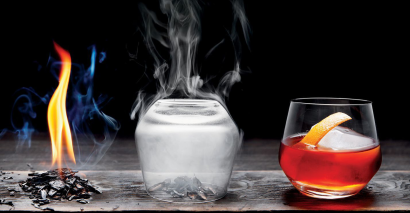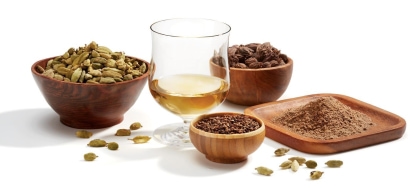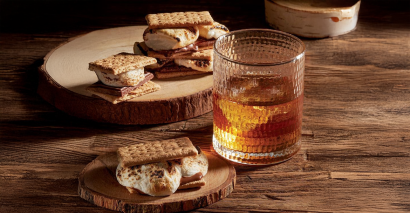
Adding water to your whisky is a science and an art. (Photo by ARICAN/iStock)
Should you add water to your whisky? Some scientists say adding water yields a more flavorful whisky, but the amount is a personal choice. Legendary bourbon distiller Pappy Van Winkle believed 50% ABV (100 proof) was the ideal alcohol concentration for whiskey. He resisted selling anything at lower proof because, he said, “I see no sense in shipping water all the way around the country.”
Van Winkle recognized, of course, that some people liked additional water with his whiskey, so he suggested adding the whiskey to the water instead. “That way you make a poor thing better rather than a fine thing worse,” he reasoned.
Of course, there is always water in whisky. By U.S. law, bourbon, rye, and corn whiskey can be distilled to no greater than 80% ABV. That means the distillate leaving the still contains at least 20% water, and for most distillers it is closer to 30%, because the sugars, phenols, lactones, esters, acetaldehydes and other chemicals that give whisky its flavor attach themselves to the water, not the ethanol. Whisky without water in it is vodka. More water is added before bottling to adjust the whisky to the preferred proof. Van Winkle's bourbon wasn't 50% ABV by accident—he made it that way.
So should you add additional water to your whisky (or the other way around)? That is entirely up to you—it's a personal choice. There is no other right answer. But once you've decided the whisky proof that suits your palate and offers the most personal enjoyment, there is a way to accurately water your whisky to taste.
Most people who add water to whisky just wing it. They pour some whisky, and splash in a little water. Some people say to add just a drop or two to “open up” the whisky, but there are benefits to greater dilution. Most straight spirits bottled at 40% ABV or more give off an “alcohol bloom” that can block your appreciation of other flavors. Adding a little room-temperature water dampens the alcohol so those other flavors can come through. Impressions of sweetness and bitterness on the palate also decrease in concert with temperature. (But again, it's your choice: drink it cold if you like it that way.) Because bourbon is so robust, experts such as Booker Noe say you can dilute it up to 1:1 (equal parts whiskey and water) without losing the essential flavor structure of the spirit. Of course, it's helpful to know exactly how much water to add to reach your ideal proof, or perhaps to adjust two whiskies to the same proof for a better comparative tasting.
How To Find Your Perfect Proof
Experiment to find your ideal proof. Start with a known volume of whisky, say 2 ounces. Pour a known volume of water into a graduated cylinder. Add small amounts of water to the whisky until you like the taste. Look at the cylinder and note how much water you have added. The formula to determine your perfect proof is ((amount of whisky)/(water added + amount of whisky) x (bottle proof) = (perfect proof)For example, if you start with 2 ounces of 100 proof whiskey and add 1/2 an ounce of water, you end up with 80 proof.
Once you know your perfect proof, this calculator will tell you exactly how much water to add to any amount of whisky to reach it.
Once you know how to proof your whisky precisely, try using the formula when comparing whiskies of different proofs, adjusting them all to the same proof to level the playing field. Among other things, you can determine if it's worth spending the extra money for a higher proof whisky that you will water to your taste.
Does The Water Matter?
You want to taste whisky, not water, so choosing the right water to add matters. That doesn't necessarily mean distilled water or something fancier. The best water to use is the same water you usually drink, whether it's bottled, filtered, or straight from the tap. Why? Because that is the flavor you are accustomed to. The exception to this is if your preferred water has strong mineral flavors, which could impact the flavor of the whisky.If nothing else, playing around with water is a cheap and easy way to add a little variety to your whisky drinking experience.




